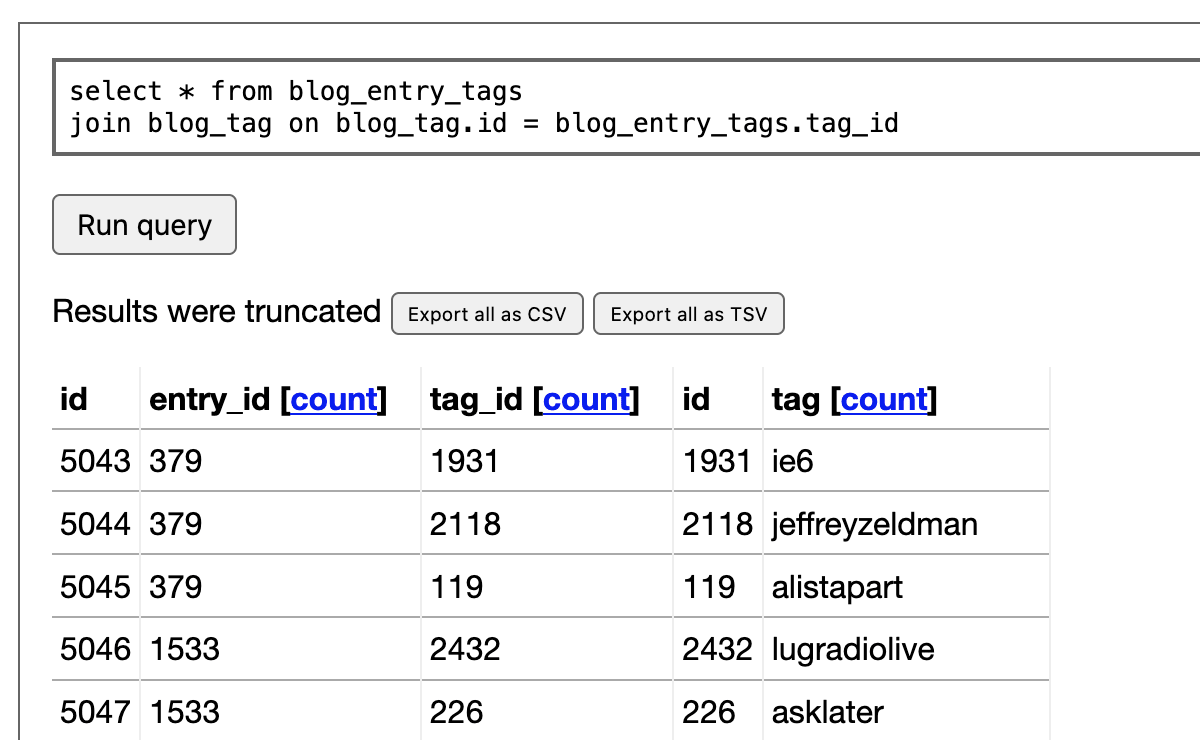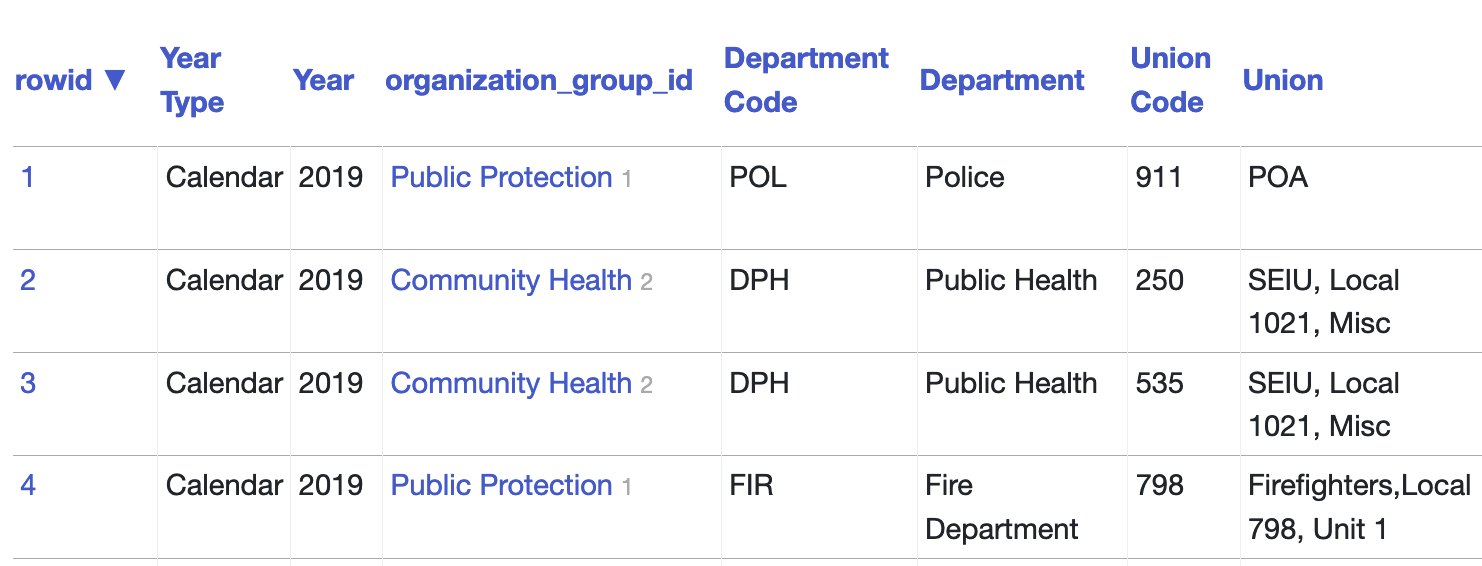110 posts tagged “databases”
2022
How SQLite Scales Read Concurrency (via) Ben Johnson’s series on SQLite internals continues—this time with a detailed explanation of how the SQLite WAL (Write-Ahead Log) is implemented.
Turning SQLite into a distributed database (via) Heyang Zhou introduces mvSQLite, his brand new open source “SQLite-compatible distributed database” built in Rust on top of Apple’s FoundationDB. This is a very promising looking new entry into the distributed/replicated SQLite space: FoundationDB was designed to provide low-level primitives that tools like this could build on top of.
SQLite Internals: Pages & B-trees (via) Ben Johnson provides a delightfully clear introduction to SQLite internals, describing the binary format used to store rows on disk and how SQLite uses 4KB pages for both row storage and for the b-trees used to look up records.
Sqitch tutorial for SQLite (via) Sqitch is an interesting implementation of database migrations: it’s a command-line tool written in Perl with an interface similar to Git, providing commands to create, run, revert and track migration scripts. The scripts the selves are written as SQL in whichever database engine you are using. The tutorial for SQLite gives a good idea as to how the whole system works.
Soft Deletion Probably Isn’t Worth It. Brandur argues that soft deletion—where you delete records by populating a “is_deleted” or “deleted_at” column in your table—isn’t worth the additional complexity and risk it adds to other database queries. Instead, he suggests having a separate deleted records table which records the deleted data in a JSON blob—allowing you to review and recover it manually if necessary, and giving you an easy way to expire deleted records that have exceeded your retention policy.
SIARD: Software Independent Archiving of Relational Databases (via) I hadn’t heard of this before but it looks really interesting: the Federal Archives of Switzerland developed a standard for archiving any relational database as a zip file full of XML which is “is used in over 50 countries around the globe”.
Postgres Auditing in 150 lines of SQL (via) I’ve run up against the problem of tracking changes made to rows within a database table so many times, and I still don’t have a preferred solution. This approach to it looks very neat: it uses PostgreSQL triggers to populate a single audit table (as opposed to one audit table per tracked table) and records the previous and current column values for the row using jsonb.
migra (via) This looks like a very handy tool to have around: run “migra postgresql:///a postgresql:///b” and it will detect and output the SQL alter statements needed to modify the first PostgreSQL database schema to match the second. It’s written in Python, running on top of SQLAlchemy.
2021
toyDB: references. toyDB is a “distributed SQL database in Rust, written as a learning project”, with its own implementations of SQL, raft, ACID transactions, B+trees and more. toyDB author Erik Grinaker has assembled a detailed set of references that he used to learn how to build a database—I’d love to see more projects do this, it’s really useful.
PostgreSQL: nbtree/README (via) The PostgreSQL source tree includes beatifully written README files for different parts of PostgreSQL. Here’s the README for their btree implementation—it continues to be actively maintained (last change was is March) and “git blame” shows that parts of the file date back 25 years, to 1996!
Django SQL Dashboard
I’ve released the first non-alpha version of Django SQL Dashboard, which provides an interface for running arbitrary read-only SQL queries directly against a PostgreSQL database, protected by the Django authentication scheme. It can also be used to create saved dashboards that can be published or shared internally.
[... 2,171 words]Query Engines: Push vs. Pull (via) Justin Jaffray (who has worked on Materialize) explains the difference between push and pull query execution engines using some really clear examples built around JavaScript generators.
In general, relying only on natural keys is a nightmare. Double nightmare if it's PII. Natural keys only work if you are flawlessly omniscient about the domain. And you aren't.
Cleaning Up Your Postgres Database (via) Craig Kerstiens provides some invaluable tips on running an initial check of the health of a PostgreSQL database, by using queries against the pg_statio_user_indexes table to find the memory cache hit ratio and the pg_stat_user_tables table to see what percentage of queries to your tables are using an index.
2020
I get asked a lot about learning to code. Sure, if you can. It's fun. But the real action, the crux of things, is there in the database. Grab a tiny, free database like SQLite. Import a few million rows of data. Make them searchable. It's one of the most soothing activities known to humankind, taking big piles of messy data and massaging them into the rigid structure required of a relational database. It's true power.
Refactoring databases with sqlite-utils extract
Yesterday I described the new sqlite-utils transform mechanism for applying SQLite table transformations that go beyond those supported by ALTER TABLE. The other new feature in sqlite-utils 2.20 builds on that capability to allow you to refactor a database table by extracting columns into separate tables. I’ve called it sqlite-utils extract.
DuckDB (via) This is a really interesting, relatively new database. It’s kind of a weird hybrid between SQLite and PostgreSQL: it uses the PostgreSQL parser but models itself after SQLite in that databases are a single file and the code is designed for use as an embedded library, distributed in a single amalgamation C++ file (SQLite uses a C amalgamation). It features a “columnar-vectorized query execution engine” inspired by MonetDB (also by the DuckDB authors) and is hence designed to run analytical queries really quickly. You can install it using “pip install duckdb”—the resulting module feels similar to Python’s sqlite3, and follows roughly the same DBAPI pattern.
Weeknotes: Rocky Beaches, Datasette 0.48, a commit history of my database
This week I helped Natalie launch Rocky Beaches, shipped Datasette 0.48 and several releases of datasette-graphql, upgraded the CSRF protection for datasette-upload-csvs and figured out how to get a commit log of changes to my blog by backing up its database to a GitHub repository.
Get Started—Materialize. Materialize is a really interesting new database—“a streaming SQL materialized view engine”. It builds materialized views on top of streaming data sources (such as Kafka)—you define the view using a SQL query, then it figures out how to keep that view up-to-date automatically as new data streams in. It speaks the PostgreSQL protocol so you can talk to it using the psql tool or any PostgreSQL client library. The “get started” guide is particularly impressive: it uses a curl stream of the Wikipedia recent changes API, parsed using a regular expression. And it’s written in Rust, so installing it is as easy as downloading and executing a single binary (though I used Homebrew).
I called it normalization because then President Nixon was talking a lot about normalizing relations with China. I figured that if he could normalize relations, so could I.
2018
Relational databases are a commodity now, but they power a much larger fraction of the world’s economy that AI ever will. And no company has a “relational database strategy”.
github/gh-ost: Thoughts on Foreign Keys? The biggest challenge I’ve seen with foreign key constraints at scale (at least with MySQL) is how they conflict with online schema migrations using tools like pt-online-schema-change or GitHub’s gh-ost. This is a good explanation of the issue by Shlomi Noach, one of the gh-ost maintainers.
Showdown: MySQL 8 vs PostgreSQL 10 (via) MySQL 8 makes comparisons between PostgreSQL and MySQL far more interesting, as it closes some of the key feature gaps. Meanwhile the PostgreSQL replication story (long one of MySQL’s key advantages) has improved dramatically in recent versions. This article offers a useful overview of the current differences, including diving into some of the less obvious implementation details that differ between the two.
2013
Is there an open source (or freely accessible) database of geofence coordinates for common places, such as cities or national parks?
Take a look at Flickr’s openly licensed shapefiles:
[... 59 words]PostgreSQL: How can I store images in a database? What existing products makes it easy for a user to upload photos into a general database?
As a general rule, it’s a bad idea to store images in a database. This is due to the large amount of space they take up, which can affect database read performance and will greatly increases the size of your backups, making them both take longer and cost more to store.
[... 187 words]What are the key insights in mastering SQL queries?
You may find this article useful (despite the list-o-matic name): 10 Easy Steps to a Complete Understanding of SQL—I’ve been using SQL for years but I found that some of the concepts explained there helped firm up my fundamental understanding of how to use it effectively.
[... 64 words]NoSQL: What is the “best” solution for storing high volumes of structured data?
On the right setup, PostgreSQL can handle petabytes. There are also commercial vendors such as Greenplum that offer data warehouse solutions built on a modified version of PostgreSQL.
[... 80 words]How was FriendFeed’s schema less db faster than pure MySQL?
The principle reason they switched to a schemaless DB was to work around the challenges of having to make schemes changes in MySQL, which can lock the table and take hours if bit days to complete in large tables.
[... 115 words]What is way that android connect to Oracle database?
As a general rule it’s not a good idea to allow mobile devices to connect directly to a server-side database, as it’s an invitation to hackers to figure out what’s going on and then connect to the database themselves for nefarious reasons.
[... 105 words]Should I store markdown instead of HTML into database fields?
You should store the exact format that was entered by the user.
[... 95 words]

